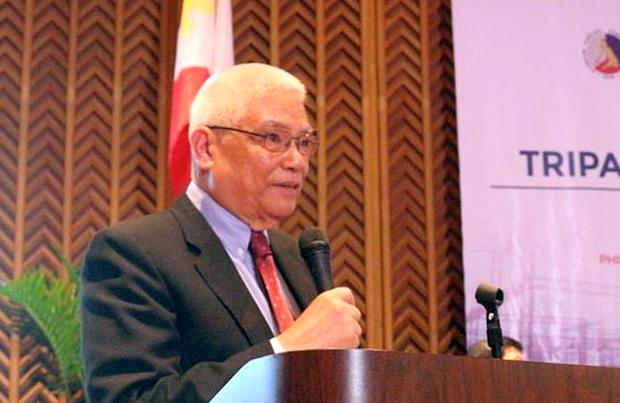DICT: Frequency auction will strengthen PLDT-Globe duopoly

DICT acting Secretary Eliseo Rio Jr. speaks at the PICC on June 8, 2018, at the signing of the Tripartite Agreement for the the utilization of spare optical fiber to boost the implementation of the National Broadband Plan (NBP). DICT signed the agreement with the National Grid Corporation of the Philippines (NGCP), and National Transmission Corporation (TransCo). (Photo from the Facebook page of the DICT)
The unpopular frequency auction favored by the Department of Finance (DOF) will ultimately benefit PLDT Inc. and Globe Telecom, according to acting Secretary Eliseo Rio Jr. of the Department of Information and Communications Technology (DICT).
This is the latest in an ongoing row between the DICT and DOF, whose disagreements that were once confined to closed-door meetings have spilled into public view in recent weeks.
At stake are the final form of the terms of reference – a key set of rules and parameters the government will use in selecting a third telco player that President Rodrigo Duterte said would break the PLDT and Globe duopoly.
In a Facebook post on Tuesday, Rio said a spectrum action would hurt the financial prospects of a new player, which would be starting from scratch against the two firms that currently control the country’s mobile market of over 100 million subscribers.
By imposing an auction – the first of its kind in the country – Rio said the third player would be encumbered by billions of pesos in upfront costs, which would be passed on to consumers.
This was said to run counter to the Duterte administration’s main objective of bringing in a new player to improve telco services while lowering costs.
“It will just make the winning telco uncompetitive to the duopoly that never paid the Filipino people for their frequencies,” Rio said. “Thus, an auction will not benefit the Filipino people, it will only benefit the duopoly.”
The DICT is currently backing a third telco selection process that rewards bidders for commitments on coverage, investment and internet speed, a model that uses what it calls the “highest committed level of service” (HCLoS).
The DOF is backing a bidding war, with the floor price set at over P6 billion.
This model, Finance Secretary Carlos Dominguez III had said, would be fair since Filipino taxpayers would reap the financial benefits of state-owned 3G, 4G and potential 5G radio frequencies to be awarded to the third player.
Rio said the President would have the final say on the matter.
The HCLoS model has found strong support among ICT advocates and telcos vying for the third player slot.
Last Friday, 11 out of 15 interested players favored the HCLoS model, while two voted in favor of an auction.
“If the auction results in a high bid price, it is highly likely that the selected third telco would work to recover the cost by passing it on to the consumer,” Mary Grace Mirandilla-Santos, lead convenor of advocacy group Better Broadband Alliance, said in a text message.
“That would defeat the purpose of putting a new player in place who will compete with the duopoly,” she added.
Radio frequencies, which allow mobile services like calls, texting and internet browsing, have historically been assigned to telco operators at no upfront cost. In exchange, they pay the government an annual spectrum user fee.
Cases where telcos have paid upfront costs for the use of assigned frequencies were private-sector led deals, most recently PLDT and Globe’s P70-billion joint buyout of San Miguel Corp.’s telco assets. That transaction is being challenged before by the Supreme Court by the Philippine Competition Commission.
This week, Dominguez emphasized to reporters that he remained doubtful about the competitive environment for a third telco unless certain issues were first resolved.
He was referring to a long-running legal row over a set of 3G radio frequencies, the formulation of a common tower policy, a final agreement between stakeholders of the government’s power transmission assets over its dark fiber network, and lower interconnection rates.
The DICT has been working to resolve the above issues.
The National Telecommunications Commission is seeking comments from the telcos on a plan to lower the interconnection rate to 10 centavos per text message and 50 centavos per minute of calling, NTC Deputy Commissioner Edgrado Cabarios said last week.
The current rates are 15 centavos per text message and P2.50 per minute for voice calls.
A number of companies vying to become the third player have also recently started to seal agreements to use the spare fiber assets of the National Transmission Corp. and private concessionaire National Grid Corp. of the Philippines.
The country’s first-ever common tower regime may formally start by early 2019, said Ramon Jacinto, Presidential Adviser on Economic Affairs and ICT. /atm
